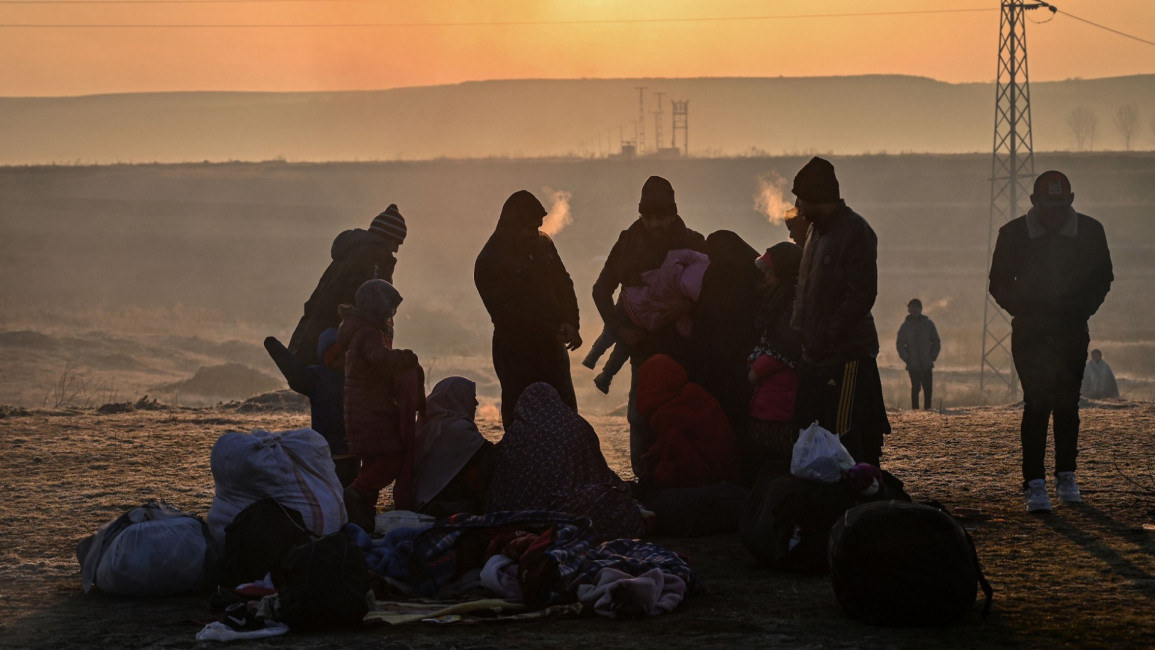Greece blocks nearly 10,000 migrants at Turkey border after Erdogan 'opens doors to Europe'
The source said its army and police had stopped thousands from entering its territory after a massive influx of migrants swelled along the border over the weekend following Erdogan's threat to open its frontier to Europe.
"From 0600 (0400 GMT) Saturday morning to 0600 Sunday morning, 9,972 illegal entrances have been averted in the Evros area," the government source said, referring to the northeastern region along the Turkey border.
Huge crowds tried to cross into Greece via the Kastanies Forest in the early hours of Sunday, the source said.
Read also: Syria Weekly: Turkey retaliation blocks regime's advance in Idlib
Greek authorities said 73 migrants had been arrested, but added that they "weren't from Idlib, but from Afghanistan, Pakistan, Somalia".
Some 13,000 migrants have gathered along the Turkish-Greek border, including families with young children, the International Organisation for Migration said on Saturday.
Greek security forces are patrolling the Evros river shores - a common crossing point - and have issued loudspeaker warnings not to enter Greek territory.
Twitter Post
|
On Saturday clashes erupted along the border, where Greek police fired tear gas at migrants who in turn lobbed rocks at officers.
Erdogan threatened to open Turkey's gates for some of the 3.6 million refugees it is harbouring as a way to pressure EU countries over the conflict in Syria.
Turkey and Russia, who back opposing forces in the conflict, have held talks to defuse tensions after the air strike left 34 Turkish troops dead, sparking fears of a broader war and a new migration crisis for Europe.
The UN says nearly a million people - half of them children - have been displaced by the fighting in northwest Syria since December, forced to flee in the bitter cold.
In 2015, Greece became the main EU entry point for one million migrants, most of them refugees fleeing the Syrian civil war.
EU Commission chief Ursula von der Leyen expressed "concern" on the unimpeded flow of migrants from Turkey to the bloc's external borders in Greece and Bulgaria.
"Our top priority at this stage is to ensure that Greece and Bulgaria have our full support," she tweeted on Saturday.
Ceasefire blocked
Meanwhile, Russia and China rejected calls for a ceasefire in Syria at an emergency UN Security Council meeting on Friday.
The UN chief made the appeal after air strikes in the last opposition stronghold in Idlib killed at least 33 Turkish troops on Thursday.
The attack heightened tensions between pro-opposition Turkey and Russia, and raised the possibility of an all-out war with millions of Syrian civilians trapped in the middle.
Guterres said he's been in very close contact with Russia and Turkey, appealing for a cease-fire in the Idlib region but "we are not yet there".
"Without urgent action," he warned, "the risk of even greater escalation grows by the hour".
The four European Union council members - France, Germany, Belgium and Estonia - said in a joint statement that "the military escalation in Idlib must stop".
"We demand an end to this Syrian military campaign supported by Russia, and fully back the calls made by the UN secretary-general for an immediate ceasefire and unimpeded humanitarian access," they said.
"We strongly urge the UN to accelerate and intensify their engagements with all relevant parties to secure an immediate cease-fire effort in northwest Syria."
The four EU countries requested the emergency meeting along with the United Kingdom, United States and Dominican Republic.
On Friday, President Recep Tayyip Erdogan spoke by phone with his Russian counterpart, Vladimir Putin, in a bid to scale down the tensions.
However, Erdogan revealed he had adopted a more aggressive tone on Saturday, warning his Russian counterpart to "get out of our way" in Syria's last rebel bastion of Idlib.
"I asked Mr Putin: 'what's your business there? If you establish a base, do so but get out of our way and leave us face to face with the regime,'" he said in Istanbul, recalling his phone conversation.
Erdogan may travel next week to Moscow for talks, according to the Kremlin.
Agencies contributed to this report.
Follow us on Facebook, Twitter and Instagram to stay connected



